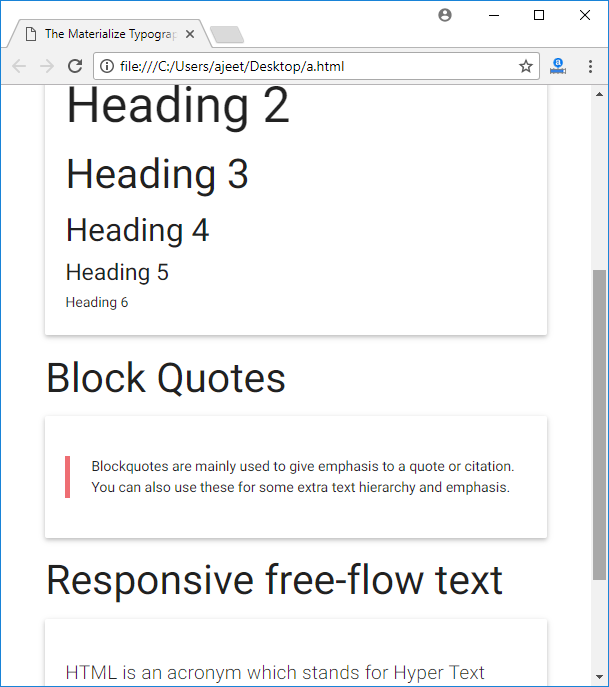Materialize CSS uses Roboto 2.0 as a standard font. It can be overridden using the following CSS style.
html {
font-family: GillSans, Calibri, Trebuchet, sans-serif;
} Example
Let’s take an example to demonstrate headings, blockquotes and free-flow but responsive text.
<!DOCTYPE html>
<html>
<head>
<title>The Materialize Typography Example</title>
<meta name = "viewport" content = "width = device-width, initial-scale = 1">
<link rel = "stylesheet"
href = "https://fonts.googleapis.com/icon?family=Material+Icons">
<link rel = "stylesheet"
href = "https://cdnjs.cloudflare.com/ajax/libs/materialize/0.97.3/css/materialize.min.css">
<script type = "text/javascript"
src = "https://code.jquery.com/jquery-2.1.1.min.js"></script>
<script src = "https://cdnjs.cloudflare.com/ajax/libs/materialize/0.97.3/js/materialize.min.js">
</script>
</head>
<body class = "container">
<h2>Typography Example</h2>
<hr/>
<h3>Headings</h3>
<div class = "card-panel">
<h1>Heading 1</h1>
<h2>Heading 2</h2>
<h3>Heading 3</h3>
<h4>Heading 4</h4>
<h5>Heading 5</h5>
<h6>Heading 6</h6>
</div>
<h3>Block Quotes</h3>
<div class = "card-panel">
<blockquote>
Blockquotes are mainly used to give emphasis to a quote or citation.
You can also use these for some extra text hierarchy and emphasis.
</blockquote>
</div>
<h3>Responsive free-flow text</h3>
<div class = "card-panel">
<p class = "flow-text">
HTML is an acronym which stands for Hyper Text Markup Language.
A markup language is a programming language that is used make text more interactive and dynamic.
It can turn a text into images, tables, links etc.
</p>
</div>
</body>
</html> Output:

Leave a Reply